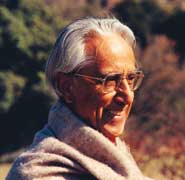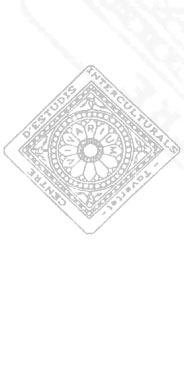




Cosmotheandric or theo-anthropo-cosmic (dimension)
“The cosmotheandric intuition is the totally integrated vision of the seamless fabric of the entire reality… the undivided consciousness of the totality” (The Cosmotheandric Experoence).
“There are not three realities: God, Man, and the World; but neither is there one, whether God, Man or World. Reality is cosmotheandric. It is our way of looking that makes reality appear to us at times under one aspect, at times under another. God, Man, and World are, so to speak, in an intimate and constitutive collaboration to construct Reality, to make history advance, to continue creation: (The Triniity and the Religious Experience of man, London and New York 1975).
The cosmotheandric intuition expresses the all embracing indissoluble union, that constitutes all of Reality: the triple dimension of reality as a whole: cosmic-divine-human. The cosmotheandric intuition is the undivided awareness of the totality." What Panikkar proposes is to live so open to this triple dimension of reality, open to others, to the world, and to God that we might achieve harmonious communion with the all: the cosmotheandric reconciliation. It is a matter of an experience more mystical and ineffable than philosophic in the traditional sense, but it breaks the customary philosophico-theological molds.
The cosmotheandric dimension is another way of expressing the radical Trinitarian conception of reality (cf. later discussion). The triadic structure and the trinitarian conception in RP are not merely in his thinking but also in his methodology, and he even organizes his writings in triadic structures as in the case of his “novenas” (three times three).
Cosmotheandrism, "the goal and fullness of all religion" (The Trinity), is an indispensable concept for understanding panikkarian thinking. The cosmotheandric intuition, the cosmotheandric mystery, or more precisely although less euphonically, the theoanthropocosmic reality, reveals that it is relationship that unites the divine, human and cosmic reality.
Understanding this vision requires the perspective of advaitic non-dualism and of radical relativity (cf. later discussion), and a new innocence that overcomes the fragmented vision of reality that we humans have in order to achieve that understanding and unitary experience of the reality in which we are immersed.
This new innocence “has been freed from the longing for perfection, which necessarily implies being better than the rest… It is pure aspiration… [It is situated in] the realm of pure grace” (La nueva inocencia, Estella 1993). The aspiration to harmony “is established in reality when we are in accord” and presupposes good humor, sweetness, serenity and peace, which are “manifestations of the structure of reality”. It is not the ingenuous dream of wanting to recover paradise, but rather “the healing, in modern Western culture, of the wound the Enlightenment inflicted by separating epistemology from ontology, by making knowledge the hunt for the object by the subject”. Thus, “no part of the dichotomy between the object, the objective thing disconnected from man and the subject, subjective mind”, falls outside the “concupiscence of objective knowledge”; rather the new innocence envelopes knowledge and the knower in the same act because it knows that the one is not given without the other”, without the relationship (Ibid.).
“If the Christian message means something, it is this experience of the cosmotheandric reality of all being, of which Jesus Christ, true God and true Man, is the paradigm. In Christ Matter is not on its own, nor is Man on one side and God on the other; none of these intrinsically united dimensions surpass the others, so that it does not make sense to affirm that Christ is more divine than human, more worldly than heavenly, or vice versa. The veil of separation has been torn, and the integration of reality begins with the redemption of man” (Culto y secularización. Apuntes para una antropología litúrgica, Madrid 1979).
official site